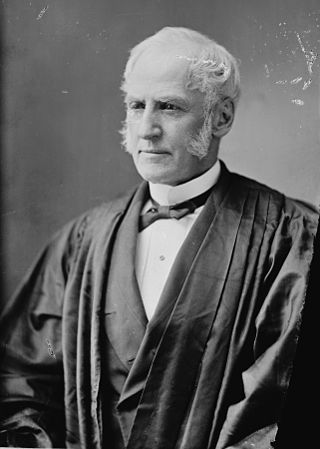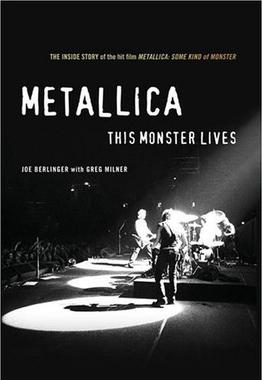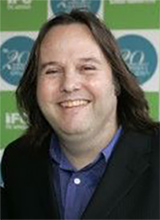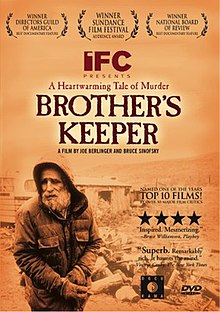
Paradise Lost 2: Revelations is a 2000 American documentary film directed and produced by Joe Berlinger and Bruce Sinofsky, and the sequel to their 1996 film Paradise Lost: The Child Murders at Robin Hood Hills, about the trials of the West Memphis Three, three teenage boys accused of the May 1993 murders and sexual mutilation of three prepubescent boys as a part of an alleged satanic ritual in West Memphis, Arkansas.

Paradise Lost: The Child Murders at Robin Hood Hills is a 1996 American documentary film directed, produced and edited by Joe Berlinger and Bruce Sinofsky about the trials of the West Memphis Three, three teenage youths accused of the May 1993 murders and sexual mutilation of three prepubescent boys as a part of an alleged satanic ritual in West Memphis, Arkansas.

Ward Hunt was an American jurist and politician. He was Chief Judge of the New York Court of Appeals from 1868 to 1869, and an associate justice of the U.S. Supreme Court from 1872 to 1882.

Metallica: Some Kind of Monster is a 2004 American documentary film about American heavy metal band Metallica. The film follows the band from 2001 to 2003, a turbulent period in the band's history which included the production of their 2003 album St. Anger, frontman James Hetfield entering into rehab for alcoholism and the departure of bassist Jason Newsted as well as the hiring of his replacement Robert Trujillo. The title of the film comes from a song from St. Anger.

William Garfield Greaves was an American documentary filmmaker and a pioneer of film-making. After trying his hand at acting, he became a filmmaker who produced more than two hundred documentary films, and wrote and directed more than half of these. Greaves garnered many accolades for his work, including four Emmy nominations.

Joseph Berlinger is an American documentary filmmaker and producer. Particularly focused on true crime documentaries, Berlinger's films and docu-series draw attention to social justice issues in the US and abroad in such films as Brother's Keeper, Paradise Lost: The Child Murders at Robin Hood Hills, Crude, Whitey: United States of America v. James J. Bulger and Intent To Destroy: Death, Denial and Depiction.

Metallica: This Monster Lives is a 2004 book written by Joe Berlinger and Greg Milner. The book describes how Berlinger recorded the feature-length film Metallica: Some Kind of Monster in collaboration with the music band Metallica.

Bruce Sinofsky was an American documentary film director, particularly known for his films the Paradise Lost trilogy, Brother's Keeper and Metallica: Some Kind of Monster, all created with Joe Berlinger.

Ric Burns is an American documentary filmmaker and writer. He has written, directed and produced historical documentaries since the 1990s, beginning with his collaboration on the celebrated PBS series The Civil War (1990), which he produced with his older brother Ken Burns and wrote with Geoffrey Ward.
William Kunstler: Disturbing the Universe is a documentary film about the late American civil rights attorney William Kunstler directed by daughters Emily Kunstler and Sarah Kunstler that premiered at the 25th Sundance Film Festival in January 2009.

Patrick Creadon is an American filmmaker and actor primarily known for his work in documentaries. His first film, Wordplay, profiled New York Times crossword editor Will Shortz and premiered at the 2006 Sundance Film Festival. The film screened in over 500 theatres nationwide and became the second-highest grossing documentary of that year. His second film, I.O.U.S.A., is a non-partisan examination of America's national debt problem and forecast the 2007–2008 financial crisis. I.O.U.S.A. premiered at the 2008 Sundance Film Festival and was later named one of the Top 5 Documentaries of the Year by film critic Roger Ebert.

Crude is a 2009 American documentary film directed and produced by Joe Berlinger. It follows a two-year portion of an ongoing class action lawsuit against the Chevron Corporation in Ecuador.

The Oath is a 2010 documentary film directed by Laura Poitras. It tells the cross-cut tale of two men, Abu Jandal and Salim Ahmed Hamdan, whose meeting launched them on juxtaposed paths to al-Qaeda, Osama bin Laden, the September 11 attacks, US military tribunals and the U.S. Supreme Court. The film is the second of a trilogy, with the first being My Country, My Country (2006), documenting the lives of Iraqi citizens during the U.S. occupation of Iraq. The third, Citizenfour (2014), focuses on the NSA's domestic surveillance programs. The Oath is distributed both theatrically and non-theatrically in the US by New York–based Zeitgeist Films.
Eddie Schmidt is an American director, showrunner, producer, writer, commentator and satirist. He is perhaps best known for producing several feature documentaries that premiered at the Sundance Film Festival, including Valentine Road (2013), This Film Is Not Yet Rated (2006), and Twist of Faith (2005), and for directing and showrunning television projects including Ugly Delicious (2018), Chelsea Does (2016), The Case of: JonBenét Ramsey (2016), and Good One: A Show About Jokes (2024).
RadicalMedia is an independent global media and creative production company. Founded by Jon Kamen and Frank Scherma, the company had developed film, television, and branded content.

Paradise Lost 3: Purgatory is a 2011 American documentary film directed by Joe Berlinger and Bruce Sinofsky, and sequel to their films Paradise Lost: The Child Murders at Robin Hood Hills (1996) and Paradise Lost 2: Revelations (2000). The three films are about West Memphis Three, three teenage boys accused of the May 1993 murders and sexual mutilation of three prepubescent boys as a part of an alleged satanic ritual in West Memphis, Arkansas. Purgatory offers an update on the case of the West Memphis Three, who were all recognized guilty of the murders in 1994 but kept on claiming their innocence since then, before culminating with the trio's attempt at an Alford plea.

Joe Brewster is an American psychiatrist and filmmaker who directs and produces fiction films, documentaries and new media focused on the experiences of communities of color.

Elisabeth Holm is an American film producer and screenwriter. She produced the 2014 film Obvious Child and was formerly the film program director at Kickstarter.
Kahane Cooperman is an American documentary filmmaker and television director and producer, whose 2016 documentary Joe's Violin was nominated for an Academy Award for Best Documentary Short Subject.

Damien Wayne Echols is an American author who first became known as one of three teenagers, the West Memphis Three, convicted of a triple murder in 1994 despite the lack of physical evidence connecting them to the crime and the dubious nature of the other evidence. Upon his release from death row in 2011 under an Alford plea, Echols authored several autobiographical and spiritual books. He has been featured in multiple books, documentaries, and podcasts about his spiritual works and the West Memphis Three case.
















